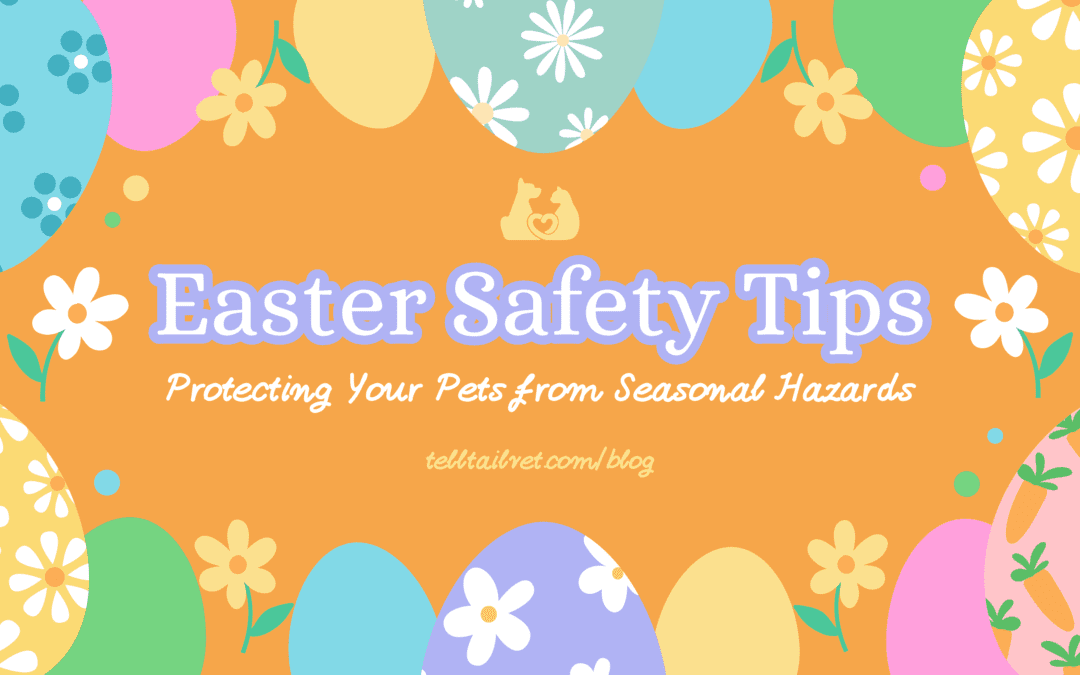Spring is in full swing, and Easter brings with it baskets of fun, festive decorations, and tasty treats. But while it’s a joyful time for families, many traditional Easter items can pose serious risks to your furry friends. At Tell Tail Veterinary Urgent Care, we’re here to help pet owners in San Diego stay alert to seasonal hazards and keep their pets safe and healthy this holiday.
Here are some common Easter dangers to be aware of and how you can celebrate safely with your pet by your side.
1. Chocolate and Candy: Keep the Sweets Out of Reach
Chocolate is one of the biggest Easter hazards for pets. It contains theobromine and caffeine, which are toxic to dogs and cats. The darker the chocolate, the more dangerous it is. Sugar-free candies and gums sweetened with xylitol are also extremely harmful, especially to dogs, and can lead to rapid insulin release and liver failure.
🛑 What to Watch For: Vomiting, diarrhea, hyperactivity, tremors, or seizures—any of these after a candy encounter should prompt a call to a veterinary professional immediately.
2. Plastic Grass and Small Toys: Hidden Dangers in Easter Baskets
While those colorful plastic grasses make Easter baskets festive, they can be tempting for curious pets. If swallowed, they can cause dangerous intestinal blockages that may require emergency surgery. Similarly, small toys or trinkets can be choking hazards or lead to internal obstruction if ingested.
🐾 Pet-Safe Tip: Skip the plastic grass altogether and opt for pet-safe paper filler or keep Easter baskets safely out of reach of inquisitive paws and snouts.
3. Easter Lilies: Pretty, But Potentially Deadly
Lilies are popular in spring floral arrangements, but many varieties, especially true lilies like Easter lilies, tiger lilies, and daylilies, are highly toxic to cats. Even licking pollen or drinking from a vase of lily water can cause severe kidney failure. Dogs may also experience stomach upset if they chew on lilies, although they are more dangerous to cats.
🌸 Safer Alternatives: Opt for pet-safe blooms like orchids and roses to keep your home festive and your pets safe.
4. Eggs: Both Real and Plastic
Whether they’re dyed hard-boiled eggs or plastic ones filled with candy, eggs can become a problem if pets find them during or after the hunt. Spoiled eggs can cause digestive upset, and plastic eggs (especially if filled with chocolate or candy) can pose choking or ingestion hazards.
🥚 Pet-Proofing Tip: Keep track of how many eggs you’ve hidden and make sure all are found before pets are let loose in the yard.
5. Guests and Gatherings: Minimize Pet Stress
If you’re hosting an Easter gathering, be mindful that not all pets enjoy the excitement. Extra noise, unfamiliar guests, and changes in routine can be stressful for some animals, leading to anxiety or behavior issues. Guests may also unknowingly feed pets unsafe table scraps.
🐶 Proactive Prep: Create a calm, quiet space where your pet can retreat if they need a break, and kindly remind guests not to share human food.
In Case of an Emergency
For poison emergencies, you can also contact the ASPCA Animal Poison Control Center at (888) 426-4435.
Celebrate a Safe and Happy Easter with Your Pets
With a little planning, you can enjoy all the fun of Easter without compromising your pet’s safety. Keep those holiday treats, flowers, and toys out of reach, and remember to keep your pet’s environment calm and secure during gatherings.
From all of us at Tell Tail Veterinary Urgent Care, have a happy, healthy, and pet-safe Easter! 🐰🌷🐾


